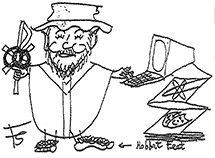CURIOUS As I see it, modern science began at the time of the Renaissance, that renewal of learning and expanding of European civilization; the discovery of printing, the discovery of the Americas, and technological advance. A thinker like Francis Bacon said “knowledge is power”; scientists like Isaac Newton described the basis of human existence and physical nature as “inert building blocks…separate from each other. Their interaction is mechanical, extrinsically devised, expressed in mathematical terms which alone are considered to be objective and impartial” (John-marc Laporte, Patience and Power)
EAGER: So where was God in that scheme?
CURIOUS: God typically, was the “Dominus” (Lord) who dominated all being by sheer power. But since the mechanisms of life, especially gravity and cosmology, could be measured and equated with forces mathematically described, and God could not be so described, God’s role was questioned, and either deism, which meant that God did not intervene in the creation, or agnosticism (= we don’t know) prevailed.
EAGER: Is modern science any different?
CURIOUS: We could count Einstein as the landmark beginning of modern science. He talked about God meaning “the way the Universe is organized”
and the closest he got to talking of God as personal was to say “God does not play dice.”
EAGER: Strange thing for him to say!
CURIOUS: Yes, he said it to summarize his opposition to an anomaly which was appearing in quantum physics. Thus new physics taught us that when the tiny particles which make up energy/matter are located, their momentum cannot be known; if their momentum is known, their locations cannot. So at the very root of physical being, there is indeterminacy.
Einstein could see that this endangered the idea of a perfectly ordered universe in which all forms of reality could be understood by deterministic cause and effect. Yet Einstein was proven, experimentally, wrong in this matter of quantum physics.
EAGER So, how does indeterminacy help us to understand God?
CURIOUS: It means something for our understanding of freedom: if we believe in our freedom, then we look to the records of various human ideas of God to see if our relation with this supreme being is one of free choice.
EAGER: As a Christian, I believe in my freedom to choose right or wrong: there may be all kinds of excuses or explanations of why I do things, but I am always in some degree responsible for my decisions.
CURIOUS. Many sociologists and psychologists would say you have little or no choice, and that your life is determined by your parents, the economy, the weather, and now the human genome.
EAGER: Do they all count as scientists?
CURIOUS: They want to be known as scientists. Indeed, the role models for many of the “human” sciences have been mechanistic and reductive.
EAGER: What do you mean by “reductive?”
CURIOUS: It means that in looking for a cause of an action or a thought, you look lower down the chain of being to some of those “inert building blocks…separate from each other” referred to before. Indeed many of the human and social disciplines look to mathematical models in their efforts to avoid subjectivity. For example many thinkers regard neurology as the cause of thinking, rather than the means of thinking, and they replace the concept of “mind” with that of “brain.” So foolish are these disciplines that the commentator Marilynne Robinson summarizes their errors in a book called Absence of Mind.
EAGER: Are there other indications of indeterminacy or freedom of choice
besides quantum physics?
CURIOUS: Yes, there is a range of indicators. I think one of the most important is the revolution in mathematics. Just after Bertrand Russell and A.N.Whitehead published their great book of mathematical theory Principia Mathematica, Kurt Gödel showed that mathematical systems cannot be solved within their internal logic ; “any formal system is necessarily incomplete… and the consistency of such a system can only be proved by recourse to methods of proof that are more general than those the system itself can generate.(David Bohm Causality and Chance in Modern Physics 154).
Jacob Bronowski extends the significance to other systems: what I have been saying about mathematics…is in fact a model of what I said…about natural systems. Gödel’s proof came as a shock to those who expected science and mathematics to explain finally and coherently everything that is…the real thunderclap of 1931-36 was to show that you could not do science and deny this…the point is that these paradoxes enter into the language of science because we not only want to write sentences in science, we want to say about them that they are true or false. And at once we are back in the universe in which we are using a language in which we refer to ourselves. (The Origins of Knowledge and Imagination)
EAGER: That means that at some point all science is within a context which is necessarily self-referential, and human subjectivity is part of the thinking process.
CURIOUS: Significantly, there is a body of careful work by fellow scientists and others, which analyses the motives and the social milieu in which people like Einstein made choices which led to their remarkable scientific theorizing. To some extent some reductionism was turned against the reductionists, especially in that disruptive fog called Deconstructionism!
EAGER: Your discourse has been very revealing. Next time I want to see if I can find parallels between these new models in science and contemporary models in faith.

